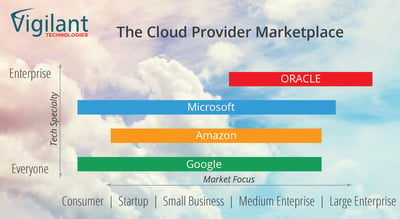You may be comparing Google Cloud to AWS and Azure. But it's Oracle your business should really be considering — at least if you're an enterprise
concerned about performance, price predictability, security and ease of use.
.png?width=424&name=OCI%20Cloud%20White%20Paper%20Cover%20Image-01%20(2).png)
Interviews with IT Leaders About Cloud Discoveries
"A lot of people originally thought they were moving to the cloud to save money, but then they discovered the diminishing returns as they got more and more of their workload over there and the savings started going down ... Usage started to outstrip the cost of running a datacenter.
"Then, enterprises started to realize that they liked some of the other benefits anyway, such as faster time to market and instant scalability. You want to bring up a new functionality or service? That used to take eight weeks. On cloud, it's an hour."

Many companies who have done thorough research, and in some cases testing, have learned that there is a point of diminishing savings for cloud computing — at least based on current pricing models. ....
The Next Generation of Cloud Wars is a 12-page report that is an invaluable resource to anyone considering cloud services for their enterprise. It tells the story of cloud computing from the perspective of businesses who have been testing the maturing cloud market and learning its benefits and challenges. From Vigilant Technologies, a boutique provider of advisory, professional and managed IT and digital services. Trusted for 20 years. Call us at 1-888-209-9424 to talk to our infrastructure experts.